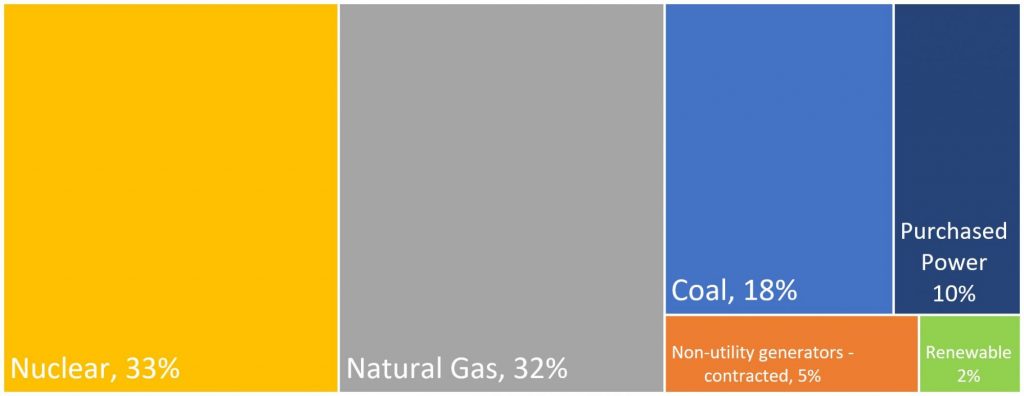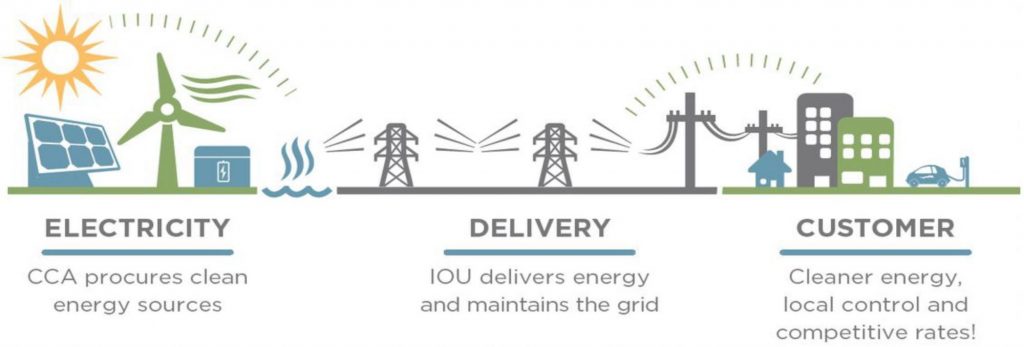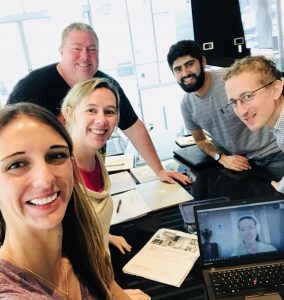This blog was originally posted on the University of Washington Program on Climate Change website on May 5, 2020, and is posted here with permission from the author.
By Lily Hahn
Here in Seattle, hydropower supplies more than 85% of our electricity. But in Arlington County, Virginia, the dominant utility derives at least 50% of its energy from fossil fuels. This leaves electricity consumers with little power over their carbon footprints—how can communities reduce their greenhouse gas emissions while tied to a utility-controlled energy mix?

2017 Energy Mix, Dominion Energy (existing utility for Arlington County; Source: VCE (http://www.virginiacleanenergy.org/cca-feasibility-study.html)
Community Choice Aggregation (CCA) offers an alternative to existing utilities, providing renewable energy options at competitive rates. As a volunteer scientist for a CCA feasibility study in Arlington County, I learned more about how CCAs can enable communities to reduce their greenhouse gas emissions from the ground up. This project also introduced me to the benefits of community science, as part of a collaborative team supported by AGU’s Thriving Earth Exchange.
What is Community Choice Aggregation?
Community Choice Aggregation (CCA) offers an alternative electric power option to residents and businesses currently served by an incumbent investor-owned utility (IOU). This enables communities to choose their power mix with a preference for renewable energy, while promoting local economic development and community environmental goals.

Community Choice Aggregation
With CCAs authorized in 9 U.S. states including Virginia, states like California and Massachusetts have already established successful CCAs. For example, Sonoma Clean Power offers the California counties of Sonoma and Mendocino a CleanStart option of 91% carbon-free electricity and an EverGreen option of 100% locally-produced renewable energy.
Can a CCA Work for Arlington County?
In Arlington, a CCA would support community goals of achieving carbon neutrality by 2050 and 100% community-wide renewable electricity by 2035. Our preliminary feasibility study suggests that a CCA is a viable option to procure 100% renewable energy on the wholesale market at a competitive price, allowing Arlington to offset its carbon footprint.
Under the 100% renewable energy CCA scenario, Arlington would experience an annual emissions offset equivalent to removing more than 200,000 cars off the road. Arlington could also offset emissions to a lesser degree with the 50% renewable energy scenario or the Virginia Renewable Portfolio Standard (RPS) scenarios shown below.

Arlington CCA Annual Emissions Reductions, 2020–2030
It is unclear whether current regulation allows Virginia CCAs to directly purchase local renewables, so the CCA may initially offset carbon emissions through purchasing unbundled Renewable Energy Certificates (RECs) on the wholesale market. However, the CCA would work toward directly purchasing local renewable energy in the future, as is currently done by many California CCAs. In the meantime, the purchase of unbundled RECs would support further development of renewables.
For more information, read the full study here or join us for a webinar on May 11, 2020.
Two Accessible Ways to Participate in Community Climate Science
Interested in participating in climate-related community science as a scientist, community leader, or facilitator? Here are some ways to get involved:
1. AGU’s Thriving Earth Exchange

The Arlington County CCA Feasibility Study Team
Our feasibility study was supported by AGU’s Thriving Earth Exchange, which pairs volunteer scientists with community leaders for project-based collaboration that addresses community priorities. My role in this study was to co-lead a chapter on CCA greenhouse gas emissions reductions, which was an exciting way to contribute to applied climate research with tangible benefits. This was also a great opportunity to collaborate with a team of six and learn more about the energy sector.
Communities can propose projects here, and volunteer scientists can apply to work on specific projects or join AGU’s Community Scientist Network to be notified of opportunities that match scientists’ interests and expertise. The Thriving Earth Exchange is also accepting applications for Community Science Fellows interested in facilitating these collaborations.
2. PCC ACORN Projects
The Program on Climate Change is launching the Actionable Community-Oriented Research eNgagement (ACORN) program to facilitate project-based collaboration between UW graduate students and community organizations while addressing community priorities. These partnerships can include one or more members of the UW PCC community, and may include students working on communication capstones for the Graduate Certificate in Climate Science. We are currently developing proto-projects, including a partnership with the carbon footprint accounting startup Reduce.
We encourage community organizations to contact us with project ideas related to climate, energy, and the environment. For PCC graduate students, stay tuned (via the PCC grads panlist) for opportunities!
Lily Hahn is a second-year PhD student in the Department of Atmospheric Sciences and member of the PCC Graduate Student Steering Committee (P-GraSC). Her research focuses on atmosphere-ocean-ice interactions and mechanisms of polar climate change. You can reach her at [email protected].
